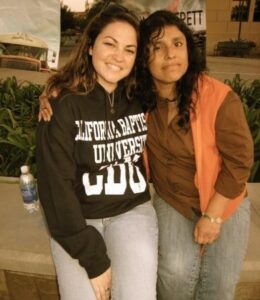Ministry Among the Marginalized
Last month, I shared Tyler Sorenson’s research and perspective on the story of Jesus and the Deaf man in Mark chapter 7. If you are not familiar with the story, I encourage you to check out Deaf Missions’ ASLV and Deaf Harbor’s CBT. His papers are available to view here. This month, we will continue on the topic of Jesus and the Deaf man, from my perspective on how Jesus responded to him and so many others. Jesus’ ministry should inform how we do ministry, especially among the marginalized.

In 2009, I was involved in the discipleship program at California Baptist University. The theme was “Courageous,” inspired by Joshua 1:9. Our team was assigned to go to Rancho Sordo Mudo (Deaf school) in Ensenada, Mexico. We watched the story of the school and the family that founded it in a documentary film named “Hearing Everett.” (See links below) Deaf life in Mexico and South America is very hard, starting with parents believing their deaf children are unable to learn. One story in the film was of Fernando, a deaf boy with Down Syndrome who looked to be between 4 and 8 years old. He stopped attending the school, and many years later Luke Everett had the chance to ask why. Fernando’s aunt explained that his mother had paid someone to put the boy on a bus to Guadalajara and abandon him in the city. It happens to many deaf children there. I still replay that scene in my mind. There must be justice for these children whom God created as image-bearers who experience His world differently. It was personal to me because at the time I was working with children who were not only Deaf but had other disabilities as well — including autism, down syndrome, intellectual disabilities, and cerebral palsy. They have very special places in my heart and I was privileged to get to know them personally. They have beautiful souls.

In 2010, my friend asked me what I would do with a million dollars. I responded without a second thought, “I want to establish several ranches [like Rancho Sordo Mudo] for abandoned Deaf children.” He looked at me like “That’s a big dream, but be real, come on…” My friend Dr. Jeff McNair says “People with disabilities are subjects of relationships not objects of programs.” This goes for Deaf children too – they need to be loved and taught, not only in a few hours of school but in homes where every thought is welcome and can be communicated clearly. To this day, my passion has not faded. In fact, my biggest dream is to build a mission program where we send teams to work with local communities and go overseas for short-term work with Deaf children. I’m desperate for Deaf children to know, while they’re young, that God designed them as His image-bearers (Genesis 1:26) with and without specific abilities (Exodus 4:11) so that they can serve Him and bring Him glory in specific ways (Ephesians 2:10). It’s not right that so many children grow up believing themselves to be unwanted, unteachable, and automatically disqualified from a relationship with their Creator. Jesus thought so too and left no room for doubting it. His hottest anger was displayed in those times when people dared to set up barriers between God and the people He came to redeem. Mark 10:13-16 tells of Jesus blessing the children after a firm word with His disciples. Mark 7 opens with Him rebuking the Pharisees for putting their rules and traditions above God’s laws. In so doing, they were setting up barriers, oppressing the people, declaring them disqualified for worship. In the next scene, Jesus healed the daughter of a Greek woman based on the woman’s faith in Him. (The Pharisees wouldn’t have approved.) Then we reach the story of the Deaf man in Mark 7:31-36.
ADVOCACY
As we look at Jesus’ 3 years of ministry alongside people, we often see Him advocating for the marginalized and showing His disciples to do likewise. It’s core to God’s character and always has been. Jesus said, you have seen me, you have seen my Father (John 14:9). They are One and in full agreement, from the creation of mankind (Genesis 1:26) through individuality (Psalm 139, Exodus 4:11), purpose (John 9:1-3, Ephesians 2:10), and even laws protecting their dignity. Leviticus 19:14 says, “Do not curse the deaf or put a stumbling block in front of the blind, but fear your God. I am the Lord.” Not only did He say “Don’t do that,” He added, in essence, “You’ll face Me.” Yet pride, greed, corruption, self-centeredness, misinformation, and more continue to raise barriers between Deaf children and the God who loves them. The barriers started coming down in the 1700s and went up again in 1880. Even today, we’re quick to emphasize the word “hearing” in Romans 10:17, as though God’s word in any other form is invalid and those without the physical ability to hear are disqualified. Why do you think there’s a huge majority of Deaf people around the world that have not known Jesus? Or that 80% of Deaf children in this world do not have access to education in sign language?
NOT DISQUALIFIED
The crowd took that Deaf man to Jesus and begged Him to touch him. Did they want to see a miracle, change the man to be “as good as” themselves, or remove barriers to his worship? Some of each, perhaps. The moment Jesus looked into the Deaf man’s eyes, He stood in silence, not using his voice or responding to the crowd. He didn’t use his voice because He knew this man was Deaf by design, and for God’s purpose. Recall John 9:1-3, when Jesus said another man’s blindness was not about sin, but about showing the glory of God. Likewise for the Deaf man. Jesus took the Deaf man aside privately, honoring him as a man with a different way of perceiving the world (1 Corinthians 9:20-23). Jesus was telling this man that he was created in God’s image, created for more: to dream, to create, to serve, to love, to share, to fulfill his role in the Great Commission. He was not created to be less than a servant. He was created to share the love of Jesus.
PRECIOUS
The most life-changing moment was when this Deaf man understood who Jesus was and who he was in Him. His value was not in his ability to hear and speak. Jesus’ touch did not eliminate his need for sign language. This Deaf man was chosen by Jesus Himself (John 15:16, John 4:4), not by the crowd. His good works were already prepared, and his job was to share Jesus with his people through shared language and experience.

My goal is to encourage the communities (including you) to identify and remove the barriers that have deprived Deaf children of getting their spiritual needs met. Those needs include free-flowing communication, a sense of belonging, and the foundation of God’s word. To keep Deaf children from learning sign language is, as I see it, to hinder access to Jesus and provoke His righteous anger. Deaf children are God’s image-bearers, the very beings that Jesus died to redeem. If we don’t address their spiritual needs, how will they know their Creator?
Yes, I do believe that through the power of our advocacy and our prayers, we will tear down the barriers built by greed and self-centeredness. We will all experience the beauty of human flourishing. Jesus fought openly against oppression and I believe that we should too. This starts with you asking, “My Lord, My God, should I learn sign language today to begin meeting the spiritual needs of Deaf children?” Shalom, my beloved readers Tanya

Reference: Hearing Everett
Visit their website: https://www.ranchosordomundo.com
Host a screening event: http://www.hearingeverettthemovie.com
Rent or Buy the film through Amazon: https://www.amazon.com/gp/video/detail/B07V3TGX5N/ref=atv_dp_share_cu_r
